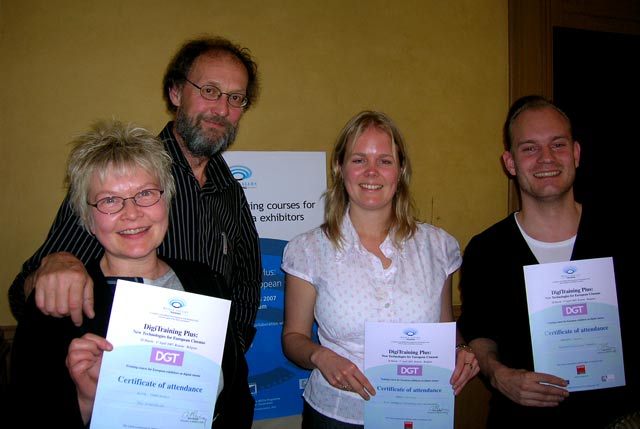
International Edition No. 23 - year 2 - 12 June 2007
***
NEW
DIGITAL EXPERIENCES AT DGT 2007
By Elisabetta Brunella, Secretary General of MEDIA
Salles
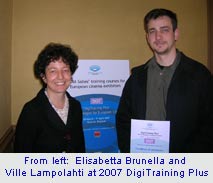 The
only one in the MEDIA Programme’s offer of training to deal with
the topic of digital cinema from the theatres’ point of view, the
MEDIA Salles course took place for the fourth time this year from 28 March
to 1st April. Once again hosted by Barco at their Kuurne quarters in Belgium
and supported by the Italian Government, “DigiTraining Plus: New
Technologies for European Cinemas” provided the necessary information
and tools of analysis for weighing up and facing an innovation which,
as summed up by one of the participants, Matthieu Bakolas, of the Ciné
Le Parc in Charleroi, “proclaims a revolution whose effects will
have a strong influence on all the professions linked to the cinema, from
authors to exhibitors”. It is in this perspective that the theatre
managers’ main interest shifts: since 2004, when the course was
launched, up to the present, the emphasis has gradually moved from the
technical aspects (How does digital projection work? What is the quality
of vision like?) to questions about the mode of transition. “Business
models”, the impact on relationships within the chain of the cinema
life cycle, the offer of products, both in the traditional sector of films
and in that of new content, were thus the main topics of the 2007 edition.
The
only one in the MEDIA Programme’s offer of training to deal with
the topic of digital cinema from the theatres’ point of view, the
MEDIA Salles course took place for the fourth time this year from 28 March
to 1st April. Once again hosted by Barco at their Kuurne quarters in Belgium
and supported by the Italian Government, “DigiTraining Plus: New
Technologies for European Cinemas” provided the necessary information
and tools of analysis for weighing up and facing an innovation which,
as summed up by one of the participants, Matthieu Bakolas, of the Ciné
Le Parc in Charleroi, “proclaims a revolution whose effects will
have a strong influence on all the professions linked to the cinema, from
authors to exhibitors”. It is in this perspective that the theatre
managers’ main interest shifts: since 2004, when the course was
launched, up to the present, the emphasis has gradually moved from the
technical aspects (How does digital projection work? What is the quality
of vision like?) to questions about the mode of transition. “Business
models”, the impact on relationships within the chain of the cinema
life cycle, the offer of products, both in the traditional sector of films
and in that of new content, were thus the main topics of the 2007 edition.
(Click here
to see the whole article)
La versione italiana di questo articolo è stata pubblicata nel
“Giornale dello Spettacolo” n. 14, del 25 maggio 2007.
The English version has been published in the “European
Cinema Journal” n. 02/2007.
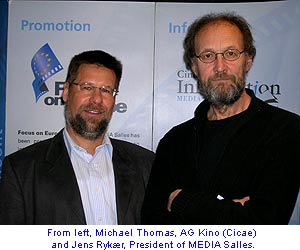
Michael Thomas’s talk at the course DigiTraining Plus centered on reflections about the present state of digital screening and its prospects, as they emerge both from direct experience of managing a cinema fitted with the new technology, and from the wide-ranging debate within the German arthouse exhibitors’ assocation, in contact with other players in the cinema industry and with public institutions.
The most important message Thomas launches is
an appeal – based on firm motivation and facts, for the digital
transition to become both an advantage for the spectator and a lever
for market expansion, based on the inclusion of all the players now
operating in the exhibition sector and, if anything, on increasing their
numbers.
An inclusive technology, therefore, and not a technology that selects
and rewards the strongest players – and products.
What can digital cinema offer
art-house-theatres?: the viewpoint of AG Kino presented by Michael Thomas
Requirements, opportunities and perspectives
Good morning ladies and gentlemen. First I want to thank Elisabetta Brunella for the invitation and the possibility to present our view.
Before I come to our subject, I would like to say a few
words about our association:
the AG Kino Gilde.
The AG Kino Gilde is the German art-house Association. Out of a total of 4,900 screens there are 575 art-house screens in Germany. 520 of these are members of the AG Kino Gilde.
What can digital cinema offer Art-house-theatres?
Presently 178 movie theatres in Germany are equipped with digital projectors and 53 of these are located in art-house-theatres. Most of these are 1.3K projectors, largely installed in the course of Euro DocuZone 2005, some others through financial sponsorship provided by the advertising companies. The rest are 2K projectors.
How will the landscape of movie-theatres – especially the segment of art-house- theatres – change once digital projection-technology is introduced on a grand scale. I don’t question that there will be a great roll-out, but the issue is when it will actually happen.
My point of view is based on the following five issues:
1) Personal and practical everyday experience with DP.
2) What requirements do we have of DP?
3) What opportunities does digital projection-technology offer theatre managers?
4) How will the market of the art-house-theatres change?
5) Remaining questions and time frame.
1. Recently there has been a dramatic increase in the digital production
of movies, especially of art and children’s movies. I would like
to give you a brief overview of the principal problems resulting from
screening digital films.
First an experience from our theatre in Bayreuth: (Bayreuth is a middle-sized town with a population of 75,000 people)
Ten days ago we showed a digital children’s film. The data was delivered to our theatre on a hard drive from which it was read into the server. The problem was that the server was unable either to recognize the data or read it. The Server Provider was contacted. An essential update was installed – a process which took several hours. During that time we had to ask ourselves why we hadn’t received the update earlier.
News
from MEDIA Salles
The new issue of the “European Cinema Journal” presented in Cannes
Updated figures on cinema-going in 2006 reveal a positive trend: audiences grow by 3.5% in the European Union
Updated information on cinema-going in Europe
in 2006 in the MEDIA Salles Newsletter “European Cinema
Journal” no. 2/2007 was presented during the Cannes Film
Festival on 21 May. At the MEDIA Salles “happy hour”, the
traditional gathering for cinema professionals and journalists, the President
of the Association, Jens Rykær, declared: “We are happy that
2006 has seen an increase in audiences in European cinemas and that in
several countries Europe’s films have obtained significant market
shares. These results are a source of satisfaction for MEDIA Salles, which
has been committed to raising the visibility of European films and promoting
cinema-going in cinemas all over Europe for 15 years, through its information,
promotion and training initiatives”.
The trend of cinema-going in 2006 was commented on by Elisabetta Brunella,
Secretary General of MEDIA Salles, and Mike Vickers, Treasurer.
Dr Joachim Ph. Wolff, Scientific Consultant for the “European Cinema
Yearbook”, explained the analysis, reported in this new issue of
the Newsletter, of the reasons for the drop in spectators in 2005, due
mainly to the lower appeal of mainstream films.
(Click here to
see the whole article)
(Click here to see the "European
Cinema Journal" no.2/2007)
Presentation of the "European Cinema Journal" at the Cinecittà space, during the Cannes Film Festival.
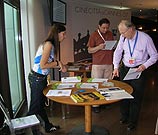
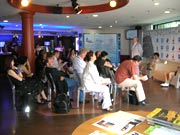
On 22 May, in Cannes, the MEDIA Salles statutory
meetings were held.
Amongst the business on the agenda, the election of the Executive Committee
for the coming three years, which is formed as follows:
- Jens Rykær (DK): President;
- Walter Vacchino (I): Vice President;
- Mike Vickers (UK): Treasurer;
- Domenico Dinoia (I): member of the Executive Committee;
- Pierre Todeschini (F): member of the Executive Committee.
New MEDIA Salles offices
On 30 June 2007 MEDIA Salles is
relocating its offices to the Milan headquarters of Agis, Italy’s
entertainment industry association.
From that moment our address will be:
MEDIA Salles
c/o Agis Lombarda
Piazza Luigi di Savoia, 24
I-20124 Milano
Italy
Tel. +39 02 6739781
E-mail: infocinema@mediasalles.it
We inform our readers that the e-mail address database@mediasalles.it
is no longer active.
To communicate with MEDIA Salles, please use the following e-mail address
only: infocinema@mediasalles.it
Digital screening of “300” at Tournai Imagix
Participants at "DigiTraining
Plus" witnessed the quality of digital images offered to audiences
as they watched a screening of the film “300” by director
Zack Snyder, which had already been presented at this year’s Berlin
Film Festival and in March was included in the programme of the Tournai
Imagix. This full-length film, which makes skillful use of special effects,
particularly in the photography, is ideal for demonstrating the potential
and the specific features of digital screening.
(Click here to see the fact
card of "300")
(Per leggere il testo in italiano cliccare qui)
Imagix: digital technology for film projection and business-to-business events
Is it possible to design a big cinema complex destined to hold thousands of people, whilst having respect for the environment amongst your objectives? The answer seems to come from the Belgian group Carpentier, owner of the Imagix chain, which includes the multiplexes of Mons (14 screens – 3,822 seats) and Tournai (10 screens – 2,259 seats). Here, for example, a solution has been adopted to favour energy saving through the installation of leds that make it possible to light each auditorium with an energy consumption equal to that of a 100-watt light bulb. Ecological sensitivity goes hand in hand with “health awareness”. The Imagix complexes also offer an alternative to classical junk food, in the form of, for instance, fresh fruit salads and fruit juices. And thought is already being given to the possible inclusion of foods such as gluten-free products for celiac sufferers or sugar-free for diabetics. In the Mons cinema it is even possible to do stretching in the fitness centre. An important detail of the Imagix brand is also to be found in the minimalist design.
(Click here to read the whole article)
(Per leggere la versione italiana di quest'articolo, cliccare qui)
Some photos of Imagix
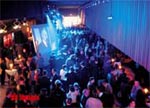

WOMEN IN DIGITAL CINEMA
Merel Gilsing
The Netherlands Film Research Foundation
Secretary General/Researcher
The Netherlands
 The
NFRF was founded in 1993 as a subsidiary of The Netherlands Cinematographic
Federation (producers, distributors and exhibitors). It is the only research
institute in The Netherlands that is specialized in research in the film
sector. Since 1st January 2004, the NFRF has been an independent
organization, associated with Utrecht University. Since February 2004,
I have collaborated on projects for the Netherlands Film Fund, The Netherlands
Association of Exhibitors and The Netherlands Association of Distributors,
amongst others. My most recent project was a national survey on cinema
going and the effect of discount actions on this behavior.
The
NFRF was founded in 1993 as a subsidiary of The Netherlands Cinematographic
Federation (producers, distributors and exhibitors). It is the only research
institute in The Netherlands that is specialized in research in the film
sector. Since 1st January 2004, the NFRF has been an independent
organization, associated with Utrecht University. Since February 2004,
I have collaborated on projects for the Netherlands Film Fund, The Netherlands
Association of Exhibitors and The Netherlands Association of Distributors,
amongst others. My most recent project was a national survey on cinema
going and the effect of discount actions on this behavior.
As a researcher I am very interested in new developments in European cinema exhibition. In this article I will address some of the recent developments and discussions in the Netherlands on digital cinema. As a recent inventory made clear, The Netherlands so far has been lacking research regarding digital cinema. It seemed the subject had not seriously touched ground. Recently, as in many European countries, new initiatives have been coming up and innovators and early adopters have been looking into the new possibilities. A Dutch Think Tank was founded to facilitate discussion between the different parties in the market and the industry has been pushing to get this subject on the political agenda.
From left: Riitta Haapiainen, Jens Rykær,
Merel Gilsing and Matthias Holz at 2007 DigiTraining Plus
